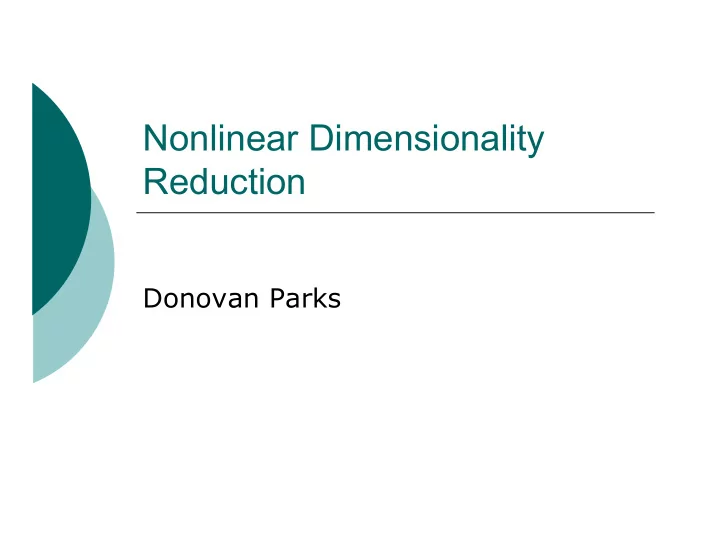

Nonlinear Dimensionality Reduction Donovan Parks
Overview Direct visualization vs. dimensionality reduction Nonlinear dimensionality reduction techniques: ISOMAP, LLE, Charting A fun example that uses non- metric, replicated MDS
Direct visualization Visualize all dimensions Sources: Chuah (1998), Wegman (1990)
Dimensionality reduction Visualize the intrinsic low-dimensional structure within a high-dimensional data space Ideally 2 or 3 dimensions so data can be displayed with a single scatterplot Dimensionality Reduction
When to use: Direct visualization: Interested in relationships between attributes (dimensions) of the data Dimensionality reduction: Interested in geometric relationships between data points
Nonlinear dimensionality reduction Isometric mapping (ISOMAP) Mapping a Manifold of Perceptual Observations . Joshua B. Tenenbaum. Neural Information Processing Systems, 1998. Locally Linear Embedding (LLE) Think Globally, Fit Locally: Unsupervised Learning of Nonlinear Manifolds . Lawrence K. Saul & Sam T. Roweis. University of Pennsylvania Technical Report MS-CIS-02-18, 2002. Charting Charting a Manifold . Matthew Brand, NIPS 2003.
Why do we need nonlinear dimensionality reduction? Y X Linear DR (PCA, Classic MDS, ...) Nonlinear DR (Metric MDS , ISOMAP, LLE, ...)
ISOMAP Extension of multidimensional scaling (MDS) Considers geodesic instead of Euclidean distances
Geodesic vs. Euclidean distance Source: Tenenbaum, 1998
Calculating geodesic distances Q: How do we calculate geodesic distance?
ISOMAP Algorithm Geodesic Distance 2 1 Matrix 3 Observations in Neighborhood High -D space Graph Construct neighborhood graph Compute geodesic distance matrix Apply favorite MDS algorithm ISOMAP Embedding Modified from: Tenenbaum, 1998
Example: ISOMAP vs. MDS
Example: Punctured sphere ISOMAP generally fails for manifolds with holes
+/-’s of ISOMAP Advantages: Easy to understand and implement extension of MDS Preserves “true” relationship between data points Disadvantages: Computationally expensive Known to have difficulties with “holes”
Locally Linear Embedding (LLE) Forget about global constraints, just fit locally Why? Removes the need to estimate distances between widely separated points ISOMAP approximates such distances with an expensive shortest path search
Are local constraints sufficient? A Geometric Interpretation Maintains approximate global structure since local patches overlap
Are local constraints sufficient? A Geometric Interpretation Maintains approximate global structure since local patches overlap
LLE Algorithm 2 ( W ) � X � W X � = � i ij j i j 2 ( ) Y Y W Y � � � = � i ij j i j Source: Saul, 2002
Example: Synthetic manifolds Modified from: Saul, 2002
Example: Real face images Source: Roweis, 2000
+/-’s of LLE Advantages: More accurate in preserving local structure than ISOMAP Less computationally expensive than ISOMAP Disadvantages: Less accurate in preserving global structure than ISOMAP Known to have difficulty on non-convex manifolds (not true of ISOMAP)
Charting Similar to LLE in that it considers overlapping “locally linear patches” (called charts in this paper) Based on a statistical framework instead of geometric arguments
Charting the data Place Gaussian at each point and estimate covariance over local neighborhood Brand derives method for determining optimal covariances in the MAP sense Enforces certain constraints to ensure nearby Gaussians (charts) have similar covariance matrices
Find local coordinate systems Use PCA in each chart to determine local coordinate system Local Coordinate Systems
Connecting the charts Exploit overlap of each neighborhood to determine how to connect the charts Brand suggest a Embedded Charts weighted least squares problem to minimize error in the projection of common points
Example: Noisy synthetic data Source: Brand, 2003
+/-’s of Charting Advantage: More robust to noise than LLE or ISOMAP Disadvantage: More testing needed to demonstrate robustness to noise Unclear computational complexity Final step is quadratic in the number of charts
Conclusion: +/-’s of dimensionality reduction Advantages: Excellent visualization of relationship between data points Limitations: Computationally expensive Need many observations Do not work on all manifolds
Action Synopsis: A fun example Action Synopsis: Pose Selection and Illustration . Jackie Assa, Yaron Caspi, Daniel Cohen-Or. ACM Transactions on Graphics, 2005. Source: Assa, 2005
Aspects of motion Input: pose of person at each frame Aspects of motion: Joint position Joint angle Joint velocity Joint angular velocity Source: Assa, 2005
Dimensionality reduction Problem: How can these aspects of motion be combined? Solution: non-metric, replicated MDS distance matrix for each aspect of motion best preserves rank order of distances across several distance matrices Essentially NM-RMDS implicitly weights each distance matrix Source: Assa, 2005
Pose selection Problem: how do you select interesting poses from the “motion curve”? Typically 5-9 dimensions Assa et al. argue that interesting poses occur at “locally extreme points” Source: Assa, 2005
Finding locally extreme points Source: Assa, 2005
Do you need dimensionality reduction? Source: Assa, 2005
Example: Monkey bars Source: Assa, 2005
Example: Potential application Source: Assa, 2005
Critique of Action Synopsis Pros: + Results are convincing + Justified algorithm with user study Cons: - Little justification for selected aspects of motion - Requiring pose information as input is restrictive - Unclear that having RMDS implicitly weight aspects of motion is a good idea
Literature Papers covered: Mapping a Manifold of Perceptual Observations . Joshua B. Tenenbaum. Neural Information Processing Systems, 1998. Think Globally, Fit Locally: Unsupervised Learning of Nonlinear Manifolds . Lawrence Saul & Sam Roweis. University of Pennsylvania Technical Report MS-CIS-02-18, 2002. Charting a Manifold . Matthew Brand, NIPS 2003. Action Synopsis: Pose Selection and Illustration . Jackie Assa, Yaron Caspi, Daniel Cohen-Or. ACM Transactions on Graphics, 2005. Additional reading: Multidimensional scaling . Forrest W. Young. Forrest.psych.unc.edu/teaching/p208a/mds/mds.html A Global Geometric Framework for Nonlinear Dimensionality Reduction. Joshua B. Tenenbaum, Vin de Silva, John C. Langford, Science, v. 290 no.5500, 2000. Nonlinear dimensionality reduction by locally linear embedding. Sam Roweis & Lawrence Saul. Science v.290 no.5500, 2000. Further citations: Information Rich Glyphs for Software Management . M.C. Chuah and S.G. Eick, IEEE CG&A 18:4 1998. Hyperdimensional Data Analysis Using Parallel Coordinates . Edward J. Wegman. Journal of the American Statistical Association, Vol. 85, No. 411. (Sep., 1990), pp. 664-675 .
Recommend
More recommend